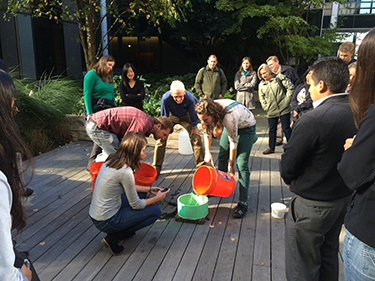|
Subscribe / Renew |
|
|
Contact Us |
|
| ► Subscribe to our Free Weekly Newsletter | |
| home | Welcome, sign in or click here to subscribe. | login |
Environment
| |
 |
September 24, 2015
LID development training is a game changer here
Herrera

Buttin
|
Picture a room full of engineers, planners and landscape architects working intently together over the sounds of barking dogs, mooing cows and crowing roosters.
Not an everyday sight to be sure! This was the scene from a Jeopardy-style game (complete with animal-themed buzzers) using one of the many innovative teaching methods that are part of a new statewide training program covering new requirements for using low-impact development (LID) to manage stormwater.
As trainer Chris Webb of Herrera Environmental Consultants put it, “The work in these classrooms directly relates to the health of our region’s waters.”
As part of the statewide training program, attendees also participated in field inspections, site visits, infiltration testing and collaborative design exercises. The program aims to balance lecture-based training with hands-on exercises that increase information retention and provide practical information on LID design and construction.
The need for training
As of Jan. 1, 2017, the NPDES municipal stormwater permit issued by the state Department of Ecology will require all permitted jurisdictions in Washington to implement LID for new development and redevelopment unless site conditions are prohibitive.
The goal of this new permit requirement is to reduce stormwater runoff volumes and improve water quality through LID. This is significant because it changes the way planners, engineers and landscape architects implement stormwater design requirements, creating an immediate need for broad scale education.
These new requirements put Washington at the forefront of national efforts to reduce stormwater impacts through innovative new techniques and education.
To prepare the region for these new requirements, Ecology partnered with Herrera to develop and implement a statewide LID training program for public and private sector professionals working in a variety of fields related to development. The goal of this program is to increase understanding, knowledge and skills to ensure LID is successfully integrated into local codes and design manuals, and that new designs based on these codes and manuals are effective.
Lead instructor Curtis Hinman of Herrera said, “The goal of this program is to bring the whole region up to a level of higher confidence in implementing LID.”
Project scale

In 2014 and 2015, Herrera led a team of experts on LID to offer a series of free technical trainings at multiple locations throughout Washington. One session was also organized with representatives of local community colleges to discuss the potential for future technical courses related to LID.
The statewide LID training program was focused on five primary groups: design engineers; operations and maintenance staff; inspection and enforcement staff; planning and permit review staff; and construction contractors and land developers. The trainings were tailored to three levels of experience — introductory, intermediate and advanced — and covered a broad range of LID facilities, topics and tools.
Meeting the technical and geographic needs of this diverse audience was a logistical challenge over the program’s first year. Despite this, the program has been immensely successful. All told, curriculum and training materials for 19 courses have been created through the program and presented at 48 different trainings. Across the 13 locations that were used for these trainings, the program has reached 1,168 attendees to prepare them for the new LID requirements.
This represents the most ambitious LID training program to be implemented in the nation to date.
Collaborative effort
The statewide LID training program was funded by the state Legislature. Ecology engaged Herrera to develop and implement the program with support from Cascadia Consulting Group, Veda Environmental, SvR, CH2M Hill, Kindred Hydro, Leaping Frog Films, StormwaterOne and the Washington Stormwater Center. Mutual Materials, Associate Earth Sciences and the city of Puyallup also provided support for specific trainings.
Next steps
The statewide LID training program will continue in 2015-16 with an emphasis on high demand courses and expanding to other regions of the state not reached during the 2014-15 trainings. In the meantime, several of the courses are available online at www.wastormwatercenter.org/lidswtrainingprogram
Melissa Buttin is the marketing manager for the water group at Herrera, which focuses on integrated water resource and low-impact development services for the life cycle of public and private projects.
Other Stories:
- Building green? Don’t forget green financing
- Survey: Shannon & Wilson
- Survey: Ridolfi
- Survey: Climate Solutions
- Survey: O’Brien & Co.
- Survey: Cascadia Consulting Group
- Survey: Golder Associates
- How deep green buildings can educate kids
- Here’s how to improve environmental health and safety
- New Ecology cleanup guidance: mirage or oasis?
- Kirkland taps county’s purple pipes for recycled water
- Drought heats up battle over water rights
- Designing infrastructure to combat climate change
- Survey: Innovex Environmental Management



